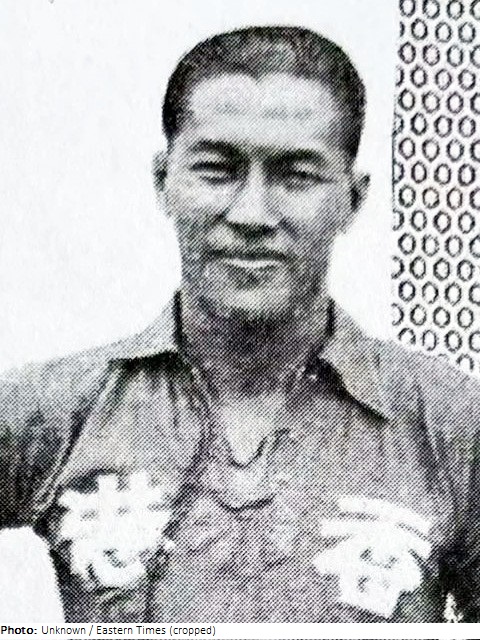Born in Hong Kong, Li Huitang spent some years of his childhood in his hometown of Wuhua (Meizhou) in the Guangdong province. He quit school at the age of 14 to work in his father’s builder’s merchant business. He started his football career with the South China Athletic Association’s “B”-team in 1922 and, as a talented striker, became a member of the “A”-team in 1923. In the same year, he played his first game with the Chinese national team at the Far Eastern Games, competing there again in 1925, scoring five goals in two matches. From 1926 until 1930 he captained the newly founded Loh Hwa team in Shanghai, challenging the local supremacy of Westerners in football. In 1931 he returned to Hong Kong and the SCAA, where he played until 1947. As captain of the national team he won two more titles at the Far Eastern Games and took part in the 1936 Olympics.
In the war between Japan and China, Li left Hong Kong for the Chinese mainland. He refused to cooperate with the occupying power and played in many fundraising games to support victims of the war. He later became Chief Sport Instructor of the emerging Chinese Army. After World War II he returned to Hong Kong and continued to play. He retired in 1947 to become Hong Kong’s football coach, and was engaged in writing and broadcasting about soccer in newspapers and other media. He also coached the Chinese team that participated in the 1948 Olympics. After the civil war, Li became the first coach of the Republic of China’s (Chinese Taipei) national football team, leading it to titles at the 1954 and 1958 Asian Games. In the 1960s he reduced his activities due to political restrictions on the country’s participation at the international level and the increasing popularity of baseball. Instead, he started to coach the Taiwanese women’s football team at Ming Chuan College. In 1965 Li also started a career as a football official, becoming vice-chairman of the Chinese Taipei Football Association and, as the first Chinese individual in this position, vice-president of FIFA.
Li was considered the best Chinese football player of all time, having scored more than 1,200 goals. Due to his activities in Taiwan, however, he is rarely commemorated in the People’s Republic of China. He died in a Hong Kong hospital after a long, severe illness. His sons also became excellent football players.

 Chinese Taipei
Chinese Taipei  People's Republic of China
People's Republic of China Hong Kong, China
Hong Kong, China CHN
CHN HKG
HKG CHN
CHN HKG
HKG TPE
TPE CHN
CHN HKG
HKG